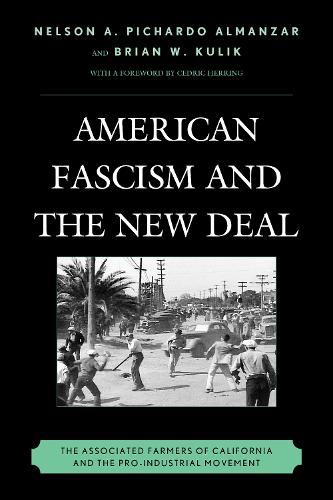
American Fascism and the New Deal: The Associated Farmers of California and the Pro-Industrial Movement
(Paperback)
Publishing Details
American Fascism and the New Deal: The Associated Farmers of California and the Pro-Industrial Movement
By (Author) Nelson A. Pichardo Almanzar
By (author) Brian W. Kulik
Bloomsbury Publishing PLC
Lexington Books
4th June 2015
United States
Classifications
Professional and Scholarly
Non Fiction
Agriculture, agribusiness and food production industries
Sociology
Population and demography
338.10979409
Physical Properties
Paperback
242
Width 154mm, Height 231mm, Spine 18mm
381g
Description
American Fascism and the New Deal demonstrate how fascist ideas gained popularity in the Associated Farmers of California during the 1930s and 40s. It shows that the politics of the intervening decades created economic and political policies that planted the seeds for these fascist ideas by forming alliances between the corporate-private realm and the state-public realm. These same alliances made FDR and subsequent political figures rethink the direction they wanted to take American democracy. Through a careful analysis of the Associated Farmers of California, Nelson A. Pichardo Almanzar and Brian Kulik show how the AFC formed positions in direct alliance with fascist ideas, but also why these ideas resonate with so many people even to this day. The analysis presented in American Fascism and the New Deal will be of particular interest to sociologists, especially social movement theorists; Chicana/o studies scholars; political scientists; business ethicists; and historians.
Reviews
Sociologists Pichardo Almanzar (Central Washington Univ.) and Kulik (Hawai'i Pacific Univ.) investigate the Associated Farmers (AF) of California during the Great Depression. The AF, an organization of elite growers founded as a pro-industrial reaction to workers, became sociopolitical by the late 1930s to counter the New Deal. The organization utilized vigilante violence to intimidate migrant agricultural workers who were on strike or attempted to organize. The authors look at the difference between European fascism and what developed in the United States. 'The AF's desire to institute a corporate state wrapped in a form of American nationalism achieved through violence and grounded on a palingenetic myth is what qualifies the AF as a fascist movement.' The AF attempted to become a national organization but was unable to gain a foothold outside the western states. The authors also take the characteristics of U.S. fascism during the interwar years and apply them to modern examples, such as the Tea Party. Ultimately, one must decide what constitutes fascism, but the authors make a strong case that the Associated Farmers qualify. . . . Summing Up: Recommended. Upper-level undergraduates and above. * CHOICE *
Author Bio
Nelson A. Pichardo Almanzar is professor of sociology and director of the Ethnic Studies Program at Central Washington University. Brian W. Kulik is associate professor of management at Hawaii Pacific University.
